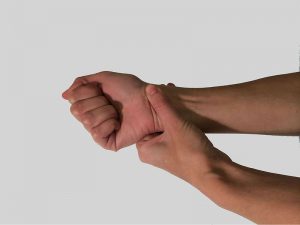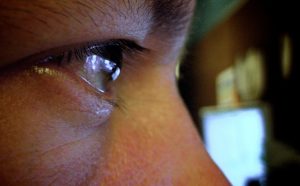This week, I have decided to discuss the health implications attached to social media addiction. I know I have briefly touched on this topic in previous blogs, but a more detailed insight is needed. It’s important to know what to look out for and where to seek help if such a thing should happen to you!
Repetitive Strain Injury:

Courtesy of Olimane via Wikimedia Commons
The NHS describe a Repetitive Strain Injury as either a muscular, nerve or tendon injury. This usually occurs as the result of repetitive movement or activity, and primarily effects the upper body.
Repetitive Strain Injuries are more likely to affect the wrists, shoulders, neck, elbows, hands/ fingers, and sometimes even parts of the back/ spine.
Symptoms to look out for consist of tenderness in the area affected, pains or aches, cramping, stiffness, etc.
Although there are other causes, this particular injury could correlate to obsessive technology use, e.g. mobile devices and desktop computers (reSTART). Many people are at increased risk of developing some form of Repetitive Strain Injury, which appears to be happening in the light of new technological addictions. Where we are constantly tapping our keyboards, staring down at our screens or maintaining bad posture as we are on our tech, our muscular and nervous systems are struggling to cope.
Part of this issue could stem towards social media addiction. We have become so addicted to checking our social media that we are constantly scrolling, staring down, or typing.
We’re so immersed in it that we don’t think about the strain we are putting on our muscles to complete these repetitive activities. If we were to reduce our social media and tech exposure, we may be less at risk of these types of injury.
Visual Strain:

Courtesy of bark via Flickr
According to The Vision Council:
“With an increase in digital technology, there has been an increase in blue light exposure”.
Blue light also takes the name High Energy Visible (HEV) light, and is damaging our vision due to its deep penetration into our eyes.
Blue light, is most commonly emitted through:
- Mobile Phones/ smartphones
- Laptops and tablets
- Desktop computers
- TVs
The more we use our devices and other forms of tech, the more exposed we become. This may not seem so serious, but it can have harmful effects to our eyes, both in the long and short term. One of our main problems is that we check our social media sites before bed. Don’t even try to deny it…the majority of us are guilty! But it is a huge problem.
Take a moment to think. If we’re sat in dark ready for bed but just sat on our phones, the only light we can see is that of our screens. Blue light is the only thing on offer to our eyes. Surely this is worse? Our eyes have nothing but blue light to stare at, meaning our exposure is at it’s highest!
This kind of light can cause blurred vision, tiredness and sore, heavy, or irritated eyes (The Vision Council). To avoid this, we need to reduce exposure and crack our social media/ tech addictions which are at the root of the problem.
This is something that needs to be reduced ASAP, or we’ll all have vision problems as we get older. Aging is hard enough without the extra worry of excessively poor vision!
Sleep Deprivation:
Going on our phones just before bed has also been proved to have links to sleep deprivation. According to Steve Smith in his Medical Daily Article:
“blue light blocks the production of melatonin, a hormone that helps us sleep at night”.
The Vision Council article also support this, stating that blue light at night increases alertness of the brain. This means it disrupts sleeping patterns and sometimes prevents us from sleeping. Again, this may not seem so serious, but if insomnia were to strike, you’ll know about it!
Even though this is problematic amongst people who use devices and visit social media just before bed, it is also caused by frequency. Smith suggests, based on Jessica Levenson‘s study, the more you visit social media, the more prone you are to sleep deprivation.
I don’t know about you guys, but I like my sleep! There is nothing more frustrating then being in bed ready to sleep, and your mind keeping you awake for hours on end. You’ll be watching the clock, counting how many hours sleep you’ll have left. It’s horrible. But now we know social media is related, we can do something about it!
If you guys happen to experience any of the issues above, I would recommend seeking professional/ medical advice. Whether it be a GP or Optician, you need to do something about it.
Thank you for following my blog and joining me in outlining the issues/health implications associated with social media addiction. I hope it has been useful and insightful for you guys! I also hope it has helped encourage you to reevaluate your social media habits and live life to the max!
Leave a Reply